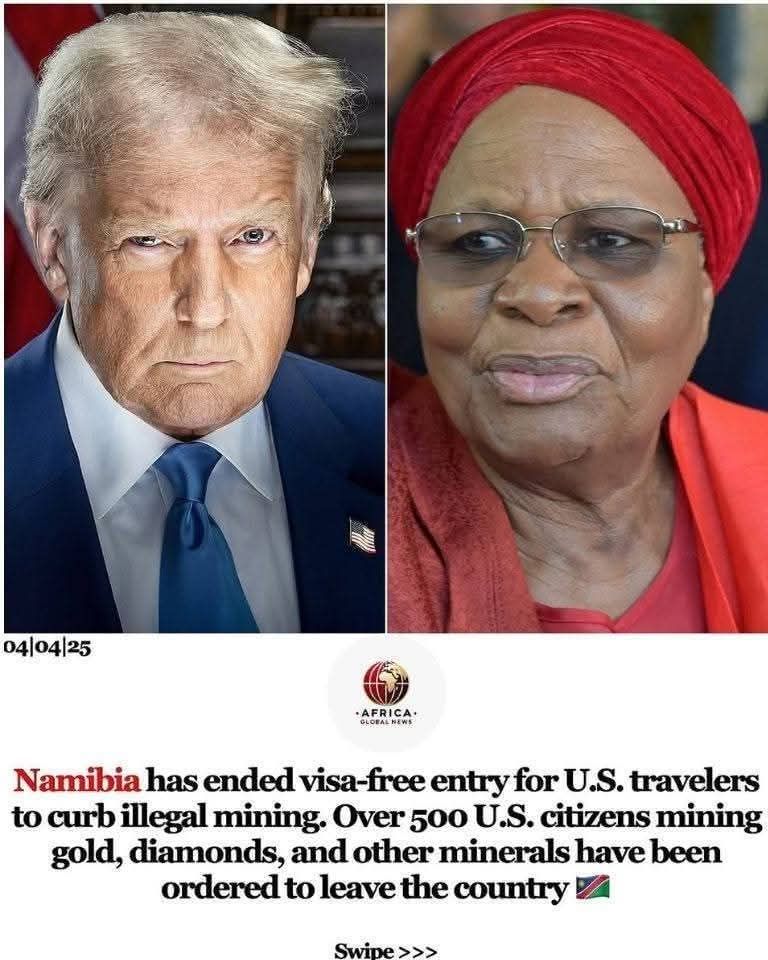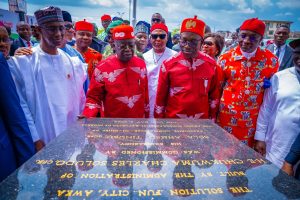The new Namibian President Dr. Netumbo Nandi-Ndaitwah regime has announced that U.S. citizens entering Namibia will require a visa.
Namibia, a Southern African nation renowned for its rich natural resources, is undergoing a pivotal shift under the leadership of its new president, Dr. Netumbo Nandi-Ndaitwah. As one of the world’s top diamond producers and a significant player in the global mining sector, Namibia has decided to implement stringent new immigration policies for U.S. citizens, marking a bold departure from previous diplomatic practices.
Starting April 1, 2025, U.S. citizens entering Namibia are now required to obtain a visa before arrival, a move that has stirred reactions in both the international diplomatic community and the business sectors. This significant policy change, aimed at tightening the nation’s immigration controls, comes with serious consequences for American nationals who have long enjoyed relatively unrestricted access to Namibia, particularly those involved in the country’s thriving mining industry. Furthermore, the policy announcement has added a layer of tension to U.S.-Namibian relations, with the enforcement of this new visa requirement expected to impact hundreds of American workers, many of whom have been operating in Namibia’s mining sector without the necessary visas.
YOU MAY READ
Namibia Makes History with Election of First Female President, Netumbo Nandi-Ndaitwah
The decision also signals a broader shift in Namibia’s approach to its natural resources, especially in the diamond industry. As the country steps up efforts to gain greater control over its mineral wealth, the new visa requirement may represent just one aspect of a larger national strategy aimed at ensuring Namibia’s sovereignty over its most valuable assets.
This article explores the ramifications of Dr. Nandi-Ndaitwah’s new immigration policy, examining its potential impact on U.S.-Namibian relations, the mining sector, and the broader economic landscape of Namibia. We will also analyze the diplomatic significance of this policy, especially in the context of Namibia’s changing global standing and its role within the African Union.
Namibia, with its stunning landscapes and vast mineral reserves, has long attracted foreign investment, particularly from countries like the United States. Since its independence in 1990, Namibia has been one of the most stable and prosperous countries in Southern Africa. However, while the country has seen significant economic growth, particularly in the mining sector, this wealth has often been accompanied by a reliance on foreign labor, technology, and expertise.
YOU MAY READ
Power Moves: The Women Changing Africa’s Leadership
The U.S. has been one of Namibia’s major economic partners, particularly in the mining industry, where American companies and nationals have played a key role. The U.S. Embassy in Windhoek reported that over 500 U.S. citizens were employed in various capacities in the Namibian mining sector. Many of these individuals had entered the country under business visas or tourist visas and were working on mining projects related to diamonds, gold, uranium, copper, and other vital minerals.
Despite their significant contribution to the Namibian economy, these U.S. nationals have often operated without the full, formal approval of the Namibian government. In response, President Dr. Netumbo Nandi-Ndaitwah, who assumed office earlier this year, has launched a crackdown on what is seen as an over-reliance on foreign labor and a lack of control over the country’s mineral resources.
This policy shift is not merely about regulating immigration; it also represents a strategic move to exert greater control over Namibia’s natural resources, ensuring that the wealth generated from the country’s mines benefits Namibian citizens and contributes to the development of the national economy.
YOU MAY READ
Zelensky Leaves White House After Being ‘Kicked Out’ by Trump Following Contentious Meeting
The direct consequence of this new visa requirement is that U.S. nationals currently residing and working in Namibia without proper visas are being forced to leave the country. According to the Namibian government, any U.S. citizen found in the country without a fully approved visa will be considered an “illegal alien,” subject to deportation. This harsh measure has raised alarms among those working in Namibia’s mining industry, with many now scrambling to comply with the new visa regulations.
For the over 500 U.S. citizens involved in mining operations across the country, this sudden change is a major disruption. Many workers had been operating under business or tourist visas, which are not intended for long-term work. These workers now face the possibility of forced removal if they do not secure the appropriate visas by the end of the grace period on April 2.
The timing of this decision—coming just as many companies are preparing for the upcoming mining season—has led to concerns about potential disruptions in mining operations. These individuals are often skilled professionals who have been integral to the success of Namibia’s mining projects, particularly in the diamond and uranium sectors.
YOU MAY READ
Trump Signs Executive Order Banning Transgender Athletes from Competing in Women’s Sports
The new visa policy is a bold diplomatic move by Dr. Nandi-Ndaitwah’s administration, signaling a shift in how Namibia engages with foreign nations. The U.S., which has long enjoyed a relatively open relationship with Namibia, may find its diplomatic relations with the southern African country strained.
This policy change comes at a time of heightened global tensions over issues such as economic inequality, resource distribution, and international influence. Namibia’s move to assert greater control over its mining sector and limit foreign influence aligns with broader trends in Africa, where many countries are increasingly focused on maximizing the benefits of their natural resources for domestic populations.
However, Namibia’s decision to specifically target U.S. citizens has sparked controversy. Critics argue that this could lead to a reduction in foreign investment and potentially harm Namibia’s economy in the short term. The United States may also view this move as an affront to its longstanding relationship with Namibia, particularly in the context of U.S. support for Namibia’s independence and democratic transition.
At the heart of Namibia’s decision to implement a stricter visa policy is its desire to gain greater control over its rich mineral resources, particularly diamonds. Namibia is one of the world’s top diamond producers, with some of the highest-quality diamonds found in its coastal areas. The country’s mining sector has long been dominated by foreign firms, particularly those from the U.S., South Africa, and Europe. These companies have controlled key sectors of the diamond mining industry, while Namibia has often been relegated to a secondary role in the value chain.
YOU MAY READ
The Economic Impact of Donald Trump’s Presidency: A Comprehensive Review
Dr. Nandi-Ndaitwah’s government aims to change that by asserting full control over the nation’s diamond mines. By tightening immigration policies and demanding that foreign workers comply with visa regulations, Namibia is sending a message that it intends to ensure that its mineral wealth directly benefits Namibians.
This move comes at a time when the global diamond market is facing increasing demand, particularly from markets like China and India. As a major producer, Namibia stands to gain from rising prices, but the country’s ability to maximize these gains depends on reducing its dependence on foreign expertise and investment. By forcing foreign workers to comply with visa requirements, Namibia hopes to build a workforce that is more local and less reliant on external actors.
Moreover, the Namibian government has expressed a desire to move away from simply exporting raw minerals and toward adding value to its resources by investing in downstream industries like cutting and polishing. By keeping foreign influence in check, Namibia hopes to encourage the growth of its domestic industries and create jobs for its citizens.
While Namibia’s new visa policy is driven by political and diplomatic motivations, the economic implications of the policy are significant. For many U.S. citizens working in Namibia, the visa requirement could mean the end of their employment. If mining operations are forced to shut down or reduce their workforce due to the sudden departure of skilled foreign labor, Namibia could see a temporary dip in productivity.
On the other hand, the policy could also encourage the development of a more skilled Namibian workforce. The government’s long-term vision appears to be the creation of a self-sustaining mining industry that relies less on foreign labor and more on domestic expertise. By requiring U.S. citizens to leave unless they obtain the necessary visas, Namibia may be pushing foreign companies to invest in local talent development programs.
YOU MAY READ
TRUMP’S TARIFFS: Understanding the Impact on US Trade with Canada, China, and Mexico
However, foreign investment may decline if companies perceive Namibia’s new visa policies as overly restrictive or unpredictable. Some may view the new regulations as a sign that Namibia is becoming less open to foreign business, which could deter future investments. In the short term, there may also be financial costs associated with complying with the new visa requirements, such as the expense of relocating workers and setting up new administrative systems.
Namibia’s actions are part of a broader global trend toward resource nationalism, where countries seek to exercise greater control over their natural resources and ensure that the benefits of extraction accrue primarily to their citizens. This trend has been seen in several countries across Africa, Latin America, and even Asia, where governments have sought to renegotiate contracts with foreign companies to increase their share of resource revenues.
In Africa, resource nationalism has been a key feature of the political landscape for the past few decades. Countries like Angola, Zambia, and South Africa have taken steps to renegotiate mining agreements and increase their control over mineral wealth. In some cases, these moves have been contentious, leading to disputes with foreign investors and diplomatic tensions.
Namibia’s new visa policy represents a similar shift, as the country seeks to assert its sovereignty over its natural resources and ensure that the wealth generated from its mines benefits Namibian citizens. This strategy may prove successful in the long term, but it will likely require careful balancing to maintain foreign investment and avoid alienating key international partners.
As Namibia navigates this new chapter under the leadership of Dr. Netumbo Nandi-Ndaitwah, the world is watching closely to see how these bold policy changes unfold. The decision to require U.S. citizens to obtain visas marks a significant shift in Namibia’s approach to immigration and foreign labor, particularly in its crucial mining sector.
Whether this policy will lead to greater economic independence for Namibia or create unforeseen challenges remains to be seen. However, what is clear is that Namibia is taking a stand in its efforts to control its natural resources, shape its economic future, and redefine its place in the global economy. As the country’s leaders continue to pursue this vision, it will undoubtedly reshape the landscape of Namibia’s mining industry and its diplomatic relations with foreign powers like the United States.
The new Namibian President Dr. Netumbo Nandi-Ndaitwah regime has announced that U.S. citizens entering Namibia will require a visa.
Any U.S. citizen caught without a fully approved visa will be declared an “illegal alien” and treated the same way Donald Trump treats African immigrants in the U.S.There are over 500 U.S. citizens mining diamonds, gold, uranium, copper, and other minerals in Namibia without visas. They have been ordered to leave today (April 1st) or face forced removal starting tomorrow.
Namibia, one of the world’s top diamond producers, is now taking full control of its diamond mines.





